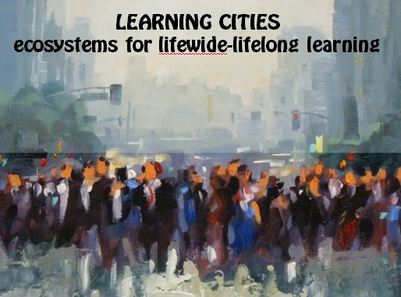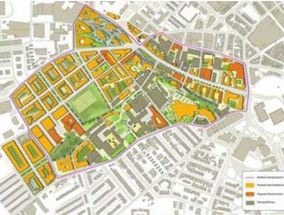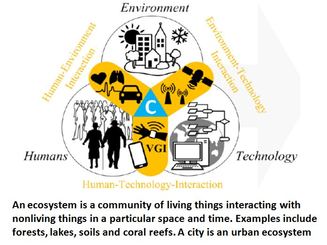
As I discovered more I began to see how the idea of a learning city could help our education institutions address the wicked problem/challenge facing all universities and colleges today namely, 'how can we help learners develop themselves in ways that will enable them to sustain themselves through whatever the world throws at them in their complex, fast changing and sometimes disrupted working and personal lives over the next 40 or 50 years or more. This is quite a different problem to helping learners prepare to enter the workforce with which all tertiary institutions are familiar.
We cannot sustain ourselves without learning and the will and attitudes and many other intangible qualities that enable us to keep going and keep trying and the idea of a learning city perhaps is one development in the evolution of mankind that might help more people achieve this goal and engage our educational institutions and their learners more directly and comprehensively in the learning lives of their city's inhabitants. Perhaps then higher education institutions will be able to claim that they are a public and social as well as a private benefit.
Its a fact that a majority of the world’s population lives in cities. By 2030, the proportion is likely to exceed sixty per cent and for some countries like the UK the proportion is much higher (over 90% by 2030). (2). As cities expand, municipal governments face challenges associated with social inclusion, new technologies, the knowledge economy, cultural diversity and environmental sustainability. In response, a growing number of cities are developing innovative strategies and cultures that allow, encourage and enable citizens of all ages, backgrounds and circumstances to learn throughout their life and in all aspects of their life, thereby helping to transform their city into a city that values and respects all forms of learning (formal, non-formal and informal).

Southampton Solent University and Southampton City College are merging and, with the backing of of the city council, their ambition is to collaborate to form what they are calling a 'Learning Quarter'. A number of towns and cities in the UK have established learning quarters, although often this means 'educational quarter' as the main resources for learning are established educational institutions. The term 'learning quarter' describes a specific geographic place or space within which their is a concentration of resources and opportunities for learning and support for people wanting to learn.
The idea underlying a city learning quarter is that people come (physically or virtually) to the place to seek and find opportunities that meet their needs and interests. While a learning quarter can result in new partnerships, attract new investment and be an asset to a city, it can also simply be a way of branding part of a city that has a concentration of educational providers: a way of making the city seem more interesting without materially affecting the life of the inhabitants of the city. It can also propagate the idea that learning and education are the same.

Learning city ecosystems are sites for the emergence of new culture. They are collaborative rather than competitive - they involve building partnerships and projects within which organisations, communities, networks, clubs, societies, charities and individuals can participate, learn from each other and share what they have learnt. Through new relationships, social interactions, participation and practices, over time a different culture emerges.
This is the wrong question of course. A city owes its existence and prosperity to the collective learning and enterprise of all of its inhabitants, and not just those who live their now but all the people who have ever lived in the city. Cities exist from the time that people came together to live in them because people chose to live cooperatively and to live, work and learn together in the same space. So the idea of a learning city is a narrative of becoming, a narrative that connects all the people of the city who are learning how to become a better version of themselves so that over time the city becomes a better version of itself.
So a better question to ask is how can any city become a better version of itself as a city that supports, encourages and where appropriate enables recognition of learning and achievement? From the articles I read (2) I tried to identify some of the practices and behaviours that cities who are striving to become better versions of themselves use.
- LEADERSHIP that is committed to achieving change over a substantial period of time. This is not a time limited project but a sustained commitment: it may take a decade to achieve a starting vision by which time the vision will have changed. Neither can leadership only be by the people who manage and control the system and its enterprises. In a city-wide ecosystem leadership needs to be distributed with activity led at all levels by all sorts of people through their own self-directed initiatives.
- VISION - that is inclusive and grown from many points of view and that evolves over time - vision is always a work in progress and ordinary people have to see their own lives in this vision. This means that the vision must embrace an inclusive concept of learning that makes sense to everyone it is designed to serve. For me this means a lifewide and lifelong view of learning that embraces individuals' formal, non-formal and informal learning.
- STRATEGY - that comprehensively engages with the vision, enables resources to be distributed and targeted and has space within it to enable unexpected things to emerge, for sure when these sorts of conditions are created in a city ecosystem lots of new and exciting possibilities will emerge
- NEW PARTNERSHIPS - city council, educational and training providers, businesses, museums, community groups, charities, clubs, anyone with an interest in helping enabling people to learn
- ACTIVE FORUM for communication and interaction for everyone who is interested
- PUBLIC RECOGNITION and celebration of what exists – making visible and connecting all the formal and non-formal opportunities that already exist and encouraging people and organisations to contribute
- PLATFORM portal/website which enables people to find opportunities for learning and grow new opportunities and participation
- BROKERS – who help connect people, communities and organisations, events, technologies and much more. They act as catalysts for new ideas & approaches and help make new things happen.
- AMBASSADORS - who promote and encourage more and more people in the communities that make up the city to involve themselves in activities through which they can learn and develop themselves
- MENTORS - who support and guide individuals as they develop and experience their own plans for learning and personal development
- AGENTS - who can recognise, validate and when appropriate provide recognition for learning and achievement
- RESEARCH – enabling the city to understand itself, capturing narratives of what it means to learn for individuals and groups (Bristol City example of ethnological research accompanying the development of the learning city) SHARING KNOWLEDGE through exhibitions, road shows, festivals, websites ++++
- ANNUAL LEARNING FESTIVALS & EXHIBITIONS – promotion and encouragement, opportunities for tasters to involve more people in the collective project: a tangible manifestation of the culture and ways of publicly demonstrating enduring commitment
So the idea of a learning city is a never ending story of becoming. and over time the sorts of activities and behaviours outlined above gradually influence culture so that there is a noticeable difference in the way people think and talk about their city. The old Nigerian proverb tells us that it 'takes a village to raise a child' but as the world becomes ever more urbanised perhaps we need to adapt the wisdom in this proverb to the new reality - perhaps it takes a city and more to sustain people through the complexity, disruptions and unanticipated unfoldings of their lives in the urban world of the 21st century.
As I read more about the idea of learning cities I began to see that lifewide education and lifewide learning have an important role to play in their practical development. In turn, a city that is committed to encouraging learning in all its forms (ie formal, non-formal and informal, directed and self-directed), provides the most favourable environment within which the practice of lifewide education and individuals' lifewide learning enterprises can flourish.
Sources
(1) www.lifewideeducation.uk/learning-cities.html
(2)https://www.theguardian.com/news/datablog/2009/aug/18/percentage-population-living-cities
Images
1 Contemporary Urban Landscape https://www.dailypainters.com/paintings/213552/PEOPLE-CITY-CROWDS-TOM-BROWN-CONTEMPORARY-URBAN-LANDSCAPE/Tom-Brown
2 Illustration of a learning quarter Bradford City UK http://urbed.coop/projects/bradford-learning-quarter-spd
3 Learning Cities - urban ecosystems – a place where people interact with each other, their environment and the opportunities, resources and technologies within it in order to (C=context)live, learn and achieve things they value. https://www.researchgate.net/publication/280316988_Contextual_Sensing_Integrating_Contextual_Information_with_
Human_and_Technical_Geo-Sensor_Information_for_Smart_Cities




 RSS Feed
RSS Feed